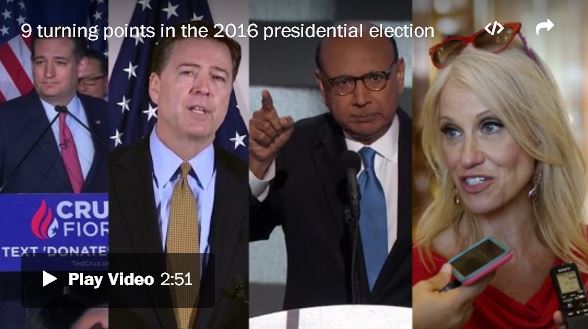Trump in final stretch pursues new opportunities to reach 270 electoral votes
In this Nov. 4, 2016, photo, voters wait in line to cast ballots at an early polling site in San Antonio. Your parents were right: Math really does matter. After all of the tumult and tedium of a long, ugly presidential campaign, Election Day is all about which candidate can win enough states to get to 270 electoral votes.(AP Photo/Eric Gay) (Eric Gay/AP)
With hours until Election Day, the wildest U.S. presidential race in memory has grown more competitive in most of the battleground states, although Democratic nominee Hillary Clinton continues to hold a broader path to victory than Republican Donald Trump.
The political map suggests that Clinton can lose several key states long assumed to be in her column and still reach the 270 electoral votes she needs to win.
Trump, meanwhile, has a new reason for optimism, as a growing number of states appear potentially within his grasp. But to win, he would have to take nearly all of them.
The 11th-hour fluidity of the race had the two campaigns scrambling the travel plans of the candidates and their top surrogates. In Trump’s case, it is an effort to grab what he considers emerging opportunities in the sprint for the finish line; in Clinton’s, as insurance against surprises Tuesday in territory she has considered hers.
Trump said Saturday that he and his running mate, Indiana Gov. Mike Pence, will hold campaign events in Minnesota, a state that has not voted for a Republican since 1972. A Trump campaign official insisted that the move was not a feint and that internal polling showed the Republican only three points behind Clinton there.
In a sign that Democrats are suddenly anxious about Michigan, on Monday, Clinton will be in Grand Rapids and President Obama will campaign in Ann Arbor. Trump and Pence will also be in Michigan in the next two days.
At a rally Saturday in Tampa, which is a bellwether of crucialFlorida, Trump said his campaign is moving aggressively to seize upon openings it sees across the country.

Republican presidential nominee Donald Trump outlined what he sees as his path to victory, predicting wins in big swing states like Pennsylvania and Florida, during a campaign rally on Nov. 5 in Reno, Nev. (The Washington Post)
“We’re going into what they used to call Democrat strongholds where we are now tied or leading,” the billionaire real estate developer said.
He predicted that he will win Florida and Pennsylvania — which both voted for Obama in the past two elections — and said that he is “doing phenomenally well in North Carolina,” where both candidates have invested significant time and resources over the past few weeks.
Later Saturday evening, Trump was rushed off the stage by security officials at a rally in Reno, Nev., as some kind of disturbance was taking place in the front of the room where he was speaking. People in the crowd scattered as U.S. Secret Service and uniformed officers jumped the barricades to apprehend an unidentified man and lead him out of the room.
Local reports said the man, who identified himself as Austyn Crites, 33, was released shortly after the incident.
Trump later concluded his rally without further incident. The Secret Service said in a statement that no weapon was found. Crites said he was holding “Republicans against Trump” sign when he was tackled by people around him.
Clinton held a rally in south Florida that was cut short by rain. She was set to hold an event Saturday night in Philadelphia that would feature a performance by pop star Katy Perry, whose song “Roar” is featured in Clinton’s closing ad running in 11 battleground states. Beyoncé and Jay Z headlined a concert for Clinton on Friday night in Cleveland.
Also on the line Tuesday is control of the Senate, where Republicans are defending 24 seats, compared with 10 for the Democrats. Trump’s performance at the top of the ticket could determine whether Democrats pick up the five seats they need to regain the majority — or four, if Clinton wins and her vice president, Tim Kaine, has a tiebreaking vote.
“The tightening of the race in many of these battleground states is providing a little bit of lift to our Senate races, and in some of these cases, it is going to be decisive,” said Steven Law, president of the Senate Leadership Fund, a Republican super PAC aligned with Senate Majority Leader Mitch McConnell (R-Ky.).
“I think we’re really on the razor’s edge,” Law said of his party’s prospects of holding the Senate. “Trump’s final position in all of this is uncertain. I don’t think he’s close enough to the pin yet to lift most of these races into the win column.”
On Thursday, the Cook Political Report predicted that Democrats will pick up four to six Senate seats, enough to gain control if Clinton is elected, but less than its earlier forecast of a five- to seven-seat gain.
Republicans also are bracing to lose seats in the House, which would diminish the largest majority they have held there since 1928. Neither side, however, expects a wave large enough to restore control to Democrats, who lost it in the 2010 midterm elections.
Clinton began the final weekend of campaigning with a narrow lead over Trump in the ongoing Washington Post-ABC News Tracking Poll. Through Friday night, the rolling survey showed Clinton at 48 percent and Trump at 43 percent, among likely voters. Libertarian Party nominee Gary Johnson was at 4 percent, and Green Party nominee Jill Stein was at 2 percent.
That’s the largest margin between the two major-party candidates this past week — and a sign that Clinton may be starting to recover from a fresh round of attention to her use of a private email account and server while she was secretary of state.
Clinton’s decision to ignore a directive that official business be conducted where possible on a government email account has dogged her since it became public last year. It reinforced the public’s long-standing doubts about her honesty and judgment, and sparked an FBI investigation of whether national security might have been compromised.
A new chapter in that saga opened on Oct. 28, when FBI Director James B. Comey informed Congress that new emails, possibly pertaining to the investigation of Clinton’s private account, had surfaced during a separate inquiry involving disgraced former congressman Anthony Weiner (D-N.Y.), the estranged husband of Clinton aide Huma Abedin.
Before that development, Clinton appeared in control of enough states to put her well over the 270 electoral-vote mark. The tightening of the polls since then has left enough states in doubt this weekend to force a modification of those earlier predictions.
A quartet of battlegrounds has dominated the Clinton campaign’s calculation throughout the fall campaign: Florida, North Carolina, Ohio and Pennsylvania. Obama won those four in 2008 and all of them but North Carolina in 2012.
Until recently, it appeared that Trump needed to sweep all four to overcome Clinton’s and the Democrats’ electoral-map advantage. But as the race has tightened, Ohio seems to have moved into the Republican column, and other states outside those four have potentially come into play.
The GOP nominee is looking to states including Michigan, New Hampshire and Wisconsin to make up a potential deficit, should he not win Florida, North Carolina and Pennsylvania.
One force that is factoring into both sides’ assessments is that more Americans are voting before Election Day, either by mail or in person. Upward of 37 million voters have already cast ballots. In key states such as Colorado, Florida, Nevada and North Carolina, it is likely that over half the electorate will have done so before Tuesday.
Those votes have not been counted, but strategists from both parties are poring over the data about who has voted and to get a preview of the contours of the 2016 electorate. The figures also give them a sense of possible trouble spots.
In past years, more Democrats have participated in early voting.
This year, however, it appears as though Republicans are closing the early-voting gap in many key states. But it is not clear whether this reflects greater enthusiasm and better organization on their part, or just a shift in the behavior of people who would have shown up anyway on Tuesday.
Polling and early-voting data suggest a number of electoral cross currents as the race heads into its final two days.
Clinton has struggled to reassemble some version of the coalition that twice elected Obama, the combination of African Americans, Hispanics, single women and young voters.
Hispanic turnout appears strong, based on early-voting data. That is a major reason Democrats think Nevada will be an easy win for Clinton, although the polls are close and Trump scheduled a stop there Saturday.
Clinton also has a double-digit advantage among female voters, who in 2012 accounted for 53 percent of the electorate.
But the Clinton campaign is worried about turnout among African Americans. The Democratic nominee and her top surrogates have made repeated visits to major cities in an effort to stoke enthusiasm among those voters, and she will end her campaign with a big rally in Philadelphia.
“Based on early vote returns, we know that strong get-out-the-vote efforts in the African American communities in Pennsylvania, Michigan, Florida and North Carolina will be needed to win on Tuesday,” AFL-CIO political director Michael Podhorzer said.
For Trump, one challenge is a socioeconomic split in the white vote. He has strong support among white voters without college degrees, but has seen an erosion in the traditional support for Republican nominees among white voters with college degrees.
This has been a central dynamic of the campaign, and Clinton campaign officials view it as a potentially decisive factor in an electoral map that has shifted since the last election.

In less than a week, the United States will have a new president-elect. These are the pivotal points in Donald Trump's and Hillary Clinton's campaigns that led to this moment. (Sarah Parnass/The Washington Post)
The split between college-educated and non-college-educated white voters has moved states such as Colorado and Virginia toward the Democrats, while giving Trump more hope of capturing industrial states in the Midwest such as Michigan, Pennsylvania and Ohio, where there is a higher concentration of non-college-educated voters.
Democrats remain skeptical that Trump, who boasts of his ability to bring new Republican voters to the polls, can crack what in recent cycles has been a “blue wall” in the upper Midwest.
“Trump is making a last bet on white, non-college-educated men in Pennsylvania, Michigan and Wisconsin,” Podhorzer said. “That’s been tried by Republican candidates before, and it hasn’t worked.”
Entering the final days of campaigning, Clinton maintains her advantage over Trump in voters’ perceptions of their qualifications and readiness to serve as president. By 55 percent to 36 percent, likely voters say she is more qualified, and by 58 percent to 32 percent they say she has a better temperament and personality to serve as president.
Clinton also is considered the candidate who better understands “the problems of people like you” and has “the stronger moral character.” In both cases, her advantage over Trump is in the single digits.
However, on the question of who is more honest and trustworthy, voters are more evenly divided, with 44 percent citing Trump and 40 percent naming Clinton. Perceptions of Clinton’s honesty have deteriorated in the final 10 days of the campaign, particularly when there was intense focus on renewed attention to her email problems.
Scott Clement in Washington; Jose DelReal, traveling with Trump; and Anne Gearan, traveling with Clinton, contributed to this report.
(The Washington Post)